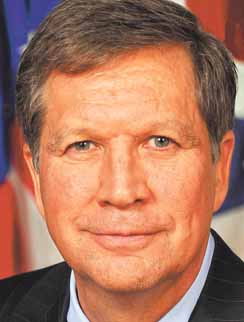Ohio legislators OK overhaul of drilling laws


Governor John Kasich
By Marc Kovac
COLUMBUS
State lawmakers have given final bipartisan approval to legislation requiring water testing near new oil and gas wells, increased disclosure by drillers and online public notice of permits.
The actions followed lengthy hearings and debates in both chambers over continued objections from some Statehouse Democrats and environmental groups, who say the legislation favors oil and gas companies at the potential expense of public safety and the environment.
The final vote on Senate Bill 315 was 73-19 in the House, with the Senate concurring on amendments, 21-8, sending the legislation to Gov. John Kasich. Rob Nichols, the governor’s spokesman, said Kasich will sign the bill.
SB 315 includes numerous provisions related to the state’s energy laws, with language related to advanced and renewable energy, water conservation and wastewater treatment.
Supporters say it would implement some of the most stringent fracking-related regulations in the country, requiring increased disclosure of fracking chemicals and water usage, water well sampling within 1,500 feet of proposed horizontal wells and so-called “cradle-to-grave” documentation and tracking of oil and gas wells from the time their started until they are capped.
Shipments of brine and other waste fluids would have to be disclosed before injection into disposal wells, with additional requirements for brine transporters. The bill also would require increased inspections of wells and liability insurance coverage for well owners.
The House added language requiring oil and gas permits to be posted online for public review within two days of approval. Lawmakers also amended the bill to enable property owners or others adversely affected by fracking fluids to sue to force drillers to release details of proprietary chemical mixtures.
Another provision requires well owners to submit quarterly reports on brine and waste-fluid disposal.
“It’s our goal, through this legislation, to make sure that we address this expansion and new technology in an appropriate and responsible manner,” said Rep. Peter Stautberg, a Republican from southwestern Ohio and chairman of the House’s public utilities committee, in urging support for the bill.
He added, “Our goal through Sub. SB 315 is to push the ball forward, to move the ball down the field and do better and do more and make sure that our water sources are protected, our people are protected, that appropriate safeguards are in place for our natural resources. There is a balance to be struck.”
Rep. Sean O’Brien of Brookfield, D-65th, called the bill a good start. “There’s more we can do and more we have to do, but it’s a start in the right direction,” he said.
But a number of Democrats said the legislation does not go far enough to protect the public or the environment or to ensure Ohioans benefit from the economic boon expected from oil and gas produced using horizontal hydraulic fracturing.
“I’m OK with this fracking or fracturing,” said Rep. Bob Hagan of Youngstown, D-60th. “I’m OK with the fact that it’s going to create so many jobs. I want those jobs in Youngstown, Ohio. But why can’t we just be honest about what we’re doing? ... Because of this industry and the control that it has on every Legislature that it deals with, they can hide the chemicals and the danger of which all of us can all be exposed.”
Democrats attempted a number of amendments, most of which failed.
Hagan offered language requiring companies applying for well permits to ensure at least 60 percent of their employees are Ohio residents.
Environmental groups sided with opponents. Jack Shaner, deputy director of the Ohio Environmental Council, said the negatives in the bill far outweigh the positives, including a block on residents’ ability to appeal the terms and conditions of well permits and inadequate disclosure.
“If we’re really going to operate without secrecy, with transparency, with open governments, these two fatal flaws have to go,” he said.
 43
43
